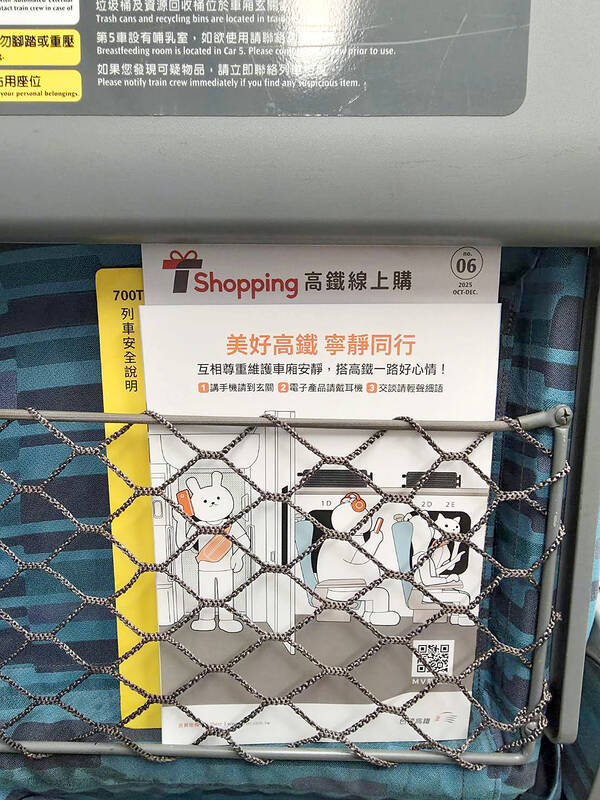Taiwan High Speed Rail Corp (THSRC) yesterday said that the company would enforce its “quiet carriage” policy through verbal reminders and gentle guidance, after drawing backlash from parents with young children in the past three weeks.
THSRC chairman Shih Che (史哲) said at a meeting of the legislature’s Transportation Committee that the policy is designed to address issues caused by passengers who do not wear headphones while watching videos or speaking loudly on the phone.
It was never intended to make it difficult for parents to travel with infants and young children, he said.

Photo courtesy of Taiwan High Speed Rail Corp
“All parents traveling with young children are welcome to board the high-speed rail system,” Shih said.
Since the company implemented the “quiet carriage” policy on Sept. 22, 17,146 verbal advisories had been issued to passengers as of Monday, THSRC data showed.
On average, about five passengers per train service were advised to wear headsets or move to the foyer to speak on the phone, it said.
Of the passengers who were given the advisory, 49 percent were speaking on the phone in the train carriage, 24 percent were watching videos without wearing headphones and 27 percent were speaking too loudly inside the carriage.
A survey conducted by THSRC also showed that nearly 90 percent of the passengers supported the campaign for “quiet carriage” culture, the company said.
Most passengers were willing to comply with the policy after being reminded by onboard staff, Shih said, adding that the policy is expected to gain broad public acceptance within six months as its enforcement approach is fine-tuned.
Democratic Progressive Party (DPP) Legislator Hsu Chih-chieh (許智傑) asked if the train could have a family carriage.
Shih said the parent-child carriage is generally available on long-distance train services in other countries.
“High-speed rail passengers in Taiwan spend on average an hour on the train. The trains are built using the model of Japan’s shinkansen system, which does not offer a family car, either,” Shih said.
“Given the significant increase in passengers, we do not have additional capacity to provide family cars, as Taiwan Railway Corp does,” Shih said, adding that the company is finding ways to make the “quiet carriage” policy more family friendly.
Apart from infants and young children, train crew would not caution passengers whose self-control ability was hindered by mental and physical illnesses, the company said.
Following complaints from the public, THSRC said that it would redesign signs about the policy.
Onboard staff, including security guards and train service personnel, would be trained to advise passengers about the policy through verbal reminders and gentle guidance, and to interact with passengers as naturally as possible, the company said.
The training would also help them improve communications skills and deepen their empathy toward passengers, it said.

Taiwan is to commence mass production of the Tien Kung (天弓, “Sky Bow”) III, IV and V missiles by the second quarter of this year if the legislature approves the government’s NT$1.25 trillion (US$39.78 billion) special defense budget, an official said yesterday. Commenting on condition of anonymity, a defense official with knowledge of the matter said that the advanced systems are expected to provide crucial capabilities against ballistic and cruise missiles for the proposed “T-Dome,” an advanced, multi-layered air defense network. The Tien Kung III is an air defense missile with a maximum interception altitude of 35km. The Tien Kung IV and V

The disruption of 941 flights in and out of Taiwan due to China’s large-scale military exercises was no accident, but rather the result of a “quasi-blockade” used to simulate creating the air and sea routes needed for an amphibious landing, a military expert said. The disruptions occurred on Tuesday and lasted about 10 hours as China conducted live-fire drills in the Taiwan Strait. The Civil Aviation Administration (CAA) said the exercises affected 857 international flights and 84 domestic flights, affecting more than 100,000 travelers. Su Tzu-yun (蘇紫雲), a research fellow at the government-sponsored Institute for National Defense and Security Research, said the air

Trips for more than 100,000 international and domestic air travelers could be disrupted as China launches a military exercise around Taiwan today, Taiwan’s Civil Aviation Administration (CAA) said yesterday. The exercise could affect nearly 900 flights scheduled to enter the Taipei Flight Information Region (FIR) during the exercise window, it added. A notice issued by the Chinese Civil Aviation Administration showed there would be seven temporary zones around the Taiwan Strait which would be used for live-fire exercises, lasting from 8am to 6pm today. All aircraft are prohibited from entering during exercise, it says. Taipei FIR has 14 international air routes and

Taiwan lacks effective and cost-efficient armaments to intercept rockets, making the planned “T-Dome” interception system necessary, two experts said on Tuesday. The concerns were raised after China’s military fired two waves of rockets during live-fire drills around Taiwan on Tuesday, part of two-day exercises code-named “Justice Mission 2025.” The first wave involved 17 rockets launched at 9am from Pingtan in China’s Fujian Province, according to Lieutenant General Hsieh Jih-sheng (謝日升) of the Office of the Deputy Chief of the General Staff for Intelligence at the Ministry of National Defense. Those rockets landed 70 nautical miles (129.6km) northeast of Keelung without flying over Taiwan,